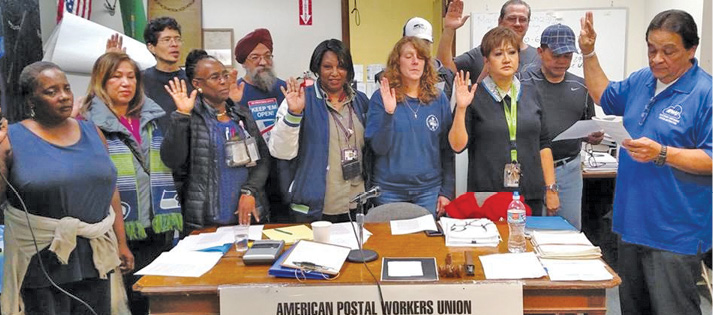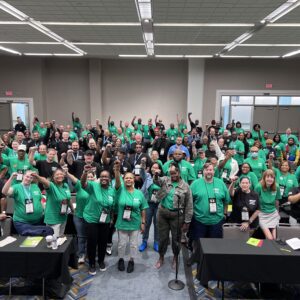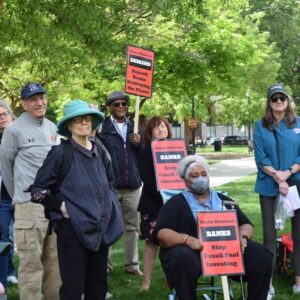April 22, 2016
Whose Union Is It Anyway
(This article first appeared in the May-June 2016 issue of The American Postal Worker magazine.)

At times, members get frustrated by the level of union representation they receive. And yes, sometimes our representation falls short. But I also suspect that much of the frustration comes from misunderstanding how our union functions.
Federal laws dictate the legal obligations of our union. Internally, the APWU Constitution dictates how we function within the law and what we stand for. Nearly every aspect of our representation is outlined in your local’s constitution and the national’s constitution. It is you, the member, that the unions’ constitutions serve to protect.
Objectives
The APWU exists to secure for you a safe and healthy work environment, better working conditions and a better standard of living. We are required to do this through collective bargaining (e.g., contract enforcement, Labor-Management Meetings, interventions etc.) and legislatively.
We are required to educate you and engage in activities that further, directly or indirectly, the joint interests of ALL union members! Our union is established as an INDUSTRIAL union of postal workers and organized in divisions (which we often call “crafts”).
The national union issues charters to local unions of 10 or more members requiring the local executive board to have representation from each division reflecting the local’s membership.
Representation
There are at least three different types of representation within our union:
• Constitutionally, each local union is entitled to representation at the National Convention, the highest governing- and policy-making body within the APWU. Delegates represent YOU and are to be elected under applicable laws to be credentialed. There is one delegate and one vote for each 25 members, determined by the amount of monthly dues paid by each local in the preceding year. The first APWU convention was the 1972 New Orleans Convention. Our 23rd Biennial Convention will be in August in Orlando.
• Contractually (and legally), the exclusive bargaining representative for ALL Clerks, Maintenance, Motor Vehicle, Material Support, Operating and Facility Services employees is the APWU, which negotiates contracts with USPS. The first Collective Bargaining Agreement was negotiated by seven separate craft unions (the Council of American Postal Employees) with the old Post Office Department. Agreement was reached on July 20, 1971, between the APWU and USPS. This contract created the grievance-arbitration procedures and the shop steward structure.
At work, any employee can discuss a grievance with his or her immediate supervisor within 14 days of learning of the cause. If the employee desires, he or she may be accompanied and represented by the employee’s steward/union representative. A grievant can exclude a steward from the Step 1 discussion (which is verbal in nature) but, under the law (the National Labor Relations Act), the bargaining representative (union rep) must be given the opportunity to be present at the adjustment of a grievance.
Formal written Step 2 appeals are done by union representatives. There must be an actual grievance involving the interpretation, application of, or compliance with the contract. Complaints must be investigated by representatives to determine if grievances exist.
• Administratively, under the unions’ constitutions, each union officer (local or national) has specific duties and responsibilities. The national union’s Clerk, Motor Vehicle Service, and Maintenance Division directors are responsible for processing ALL grievances in their divisions.
National Business Agents (NBAs), under the direction of their directors, have jurisdiction over grievances within their assigned regions or as assigned by the directors. Under the contract and national protocol, the NBAs handle all Step 3 grievances and determine, with their management counterpart, which grievances will be scheduled for arbitration hearings.
National/Local Interventions
The national president is responsible for all work of the union and all national officers work under his or her supervision. Handling grievances and scheduling arbitrations fall under the duties of the division directors and their NBAs.
At times, Regional Coordinators Sharyn Stone, John Dirzius, Mike Gallagher, Kennith Beasley and I are contacted by members, or referred by the president, regarding specific grievances. We direct the matter to the constitutionally administratively responsible officers or to the local union president. In most situations the issues involved are local matters that are best addressed at that level.
However, depending on the issue, we also attempt to intervene on the member’s behalf.
When it comes to issues within a local union, under Article 16 of the National Constitution, each local is fully autonomous. However, ALL local unions must have a constitution which they are obligated to abide by. Officers who violate the constitution may be charged in accordance with the constitution.
So Whose Union Is It?
The simple answer is YOURS! Union representatives work for you! They have a duty to provide fair representation. That doesn’t mean they can change water into wine. Nor can they do it alone. Your elected officers and stewards need your support in everything they do. Better yet, they need you to become an officer or steward to represent your brothers and sisters! Well?



